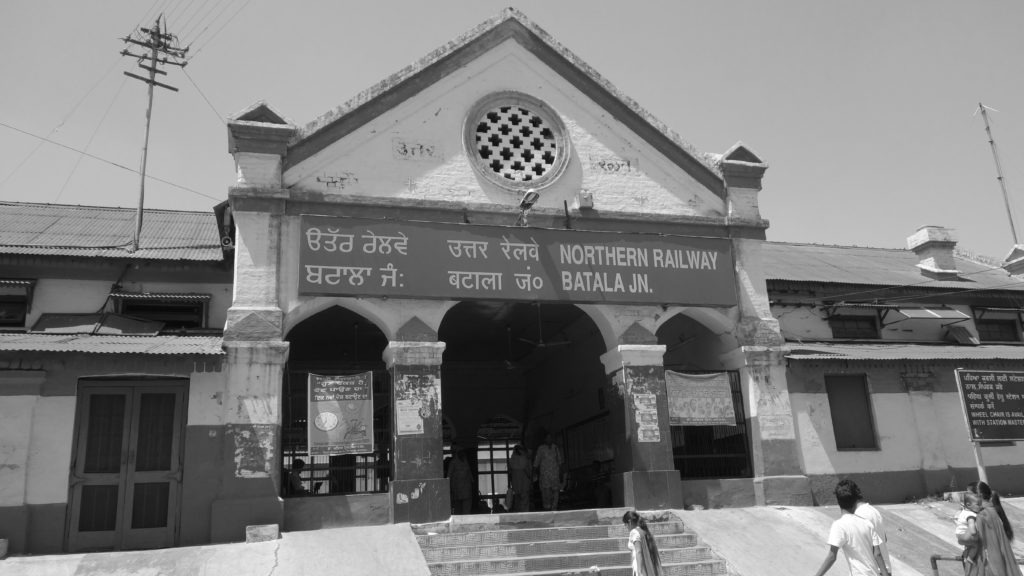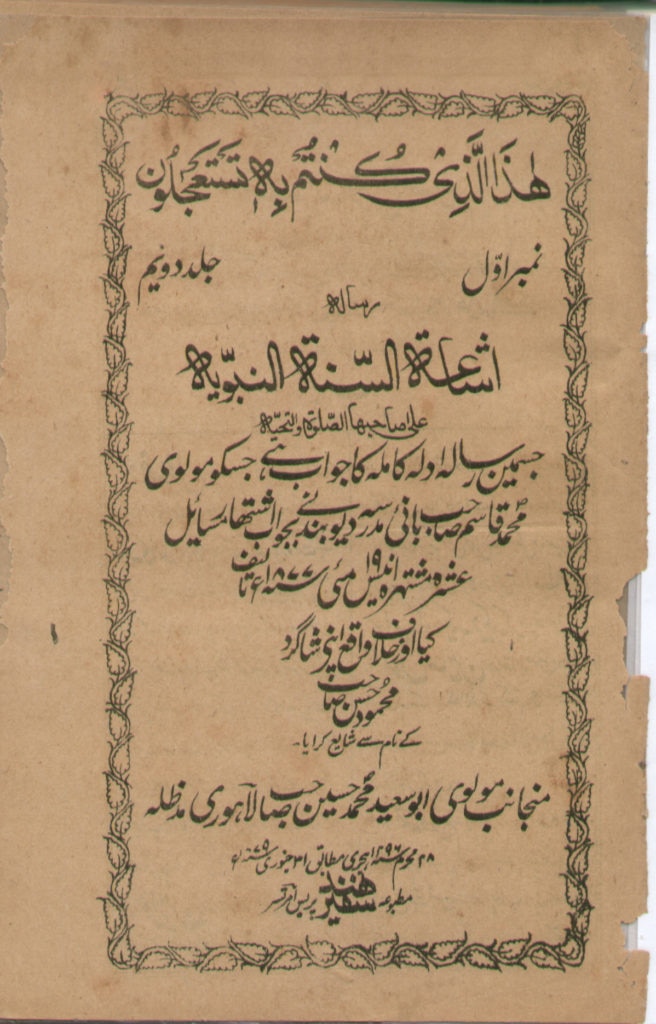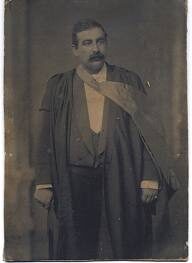Al Fazl, 12 April 1919
Once a proponent and supporter of Hazrat Mirza Ghulam Ahmadas, Maulvi Muhammad Hussain Batalvi became one of the fiercest opponents of the Promised Messiahas. However, when the time came for him to consider his children’s welfare, with the advice of Hazrat Sheikh Yaqub Ali Irfanira, he chose Talim-ul-Islam School, Qadian for their education. Below is an interview an Ahmadi conducted in 1919.
Ghulam Muhammad Khan MA
Firozpur
Having read the name of Maulvi Muhammad Hussain Batalvi in the books of the Promised Messiah, peace be upon him, I always desired to meet him and ask him certain questions that had occupied my mind for some time.
Therefore, I planned to meet him prior to this year’s Jalsa Salana in Qadian, provided he was in Batala [Maulvi Sahib’s home town] at the time. He accepted my request.
As I was not personally acquainted with him, I wrote a letter to Munshi Fazl-ur-Rahman Sahib, munsif [judge] in Batala, to take my request and inform me of the response.
Maulvi Sahib accepted my request as a result of Munshi Sahib’s efforts and agreed to meet me at his house. He also said that I should meet him prior to visiting Qadian so that I do not end up going to Qadian, a skill that he was known for being an expert in as he had been successful in stopping many others from visiting Qadian before.

Thus, in the early hours of 16 March 1919, I reached Batala. After resting at Munshi Sahib’s house, I arrived at Maulvi Muhammad Hussain Batalvi Sahib’s house. After seeking entry, I was asked to come in.
Upon entry, after seeing an aged man over the age of 80 surrounded by books, seated on a charpoy, with a fair complexion and henna-coloured beard, I expressed my curiosity about certain matters.
Maulvi Sahib peered up towards my direction and asked, “Where have you come from?”
I replied, “I am from Mianwali but reside in Firozpur nowadays and am the treasurer there. I am on my way to Qadian for the Jalsa. As you have served as a fertiliser for our Jamaat and around six to seven hundred thousand people have entered its fold, for a long time I had the desire to meet you. If I enquire about certain matters concerning Hazrat Mirza Sahib, you won’t get cross?”
Maulvi Sahib replied that he wouldn’t. I reached into my pocket, pulled out one rupee and placed it in Maulvi Sahib’s hand so that the hand that wrote words of praise for Barahin-e-Ahmadiyya and for whom the Promised Messiahas wrote the following wouldn’t go empty-handed:
و لِله دَرّك حين قَرّظتَ مخلصًا
كتابي و صرتَ لكلِّ ضالٍّ مخفّرُ
[And what a wonderful review you wrote – with sincerity – for my book, Barahin-e-Ahmadiyya, becoming a guide for everyone fallen astray!] [Barahin-e-Ahmadiyya Part V (English translation), p. 453]
Initially, Maulvi Sahib declined and said that he had plenty of money, but I insisted, “No, please take this because this hand deserves it.” Only then did Maulvi Sahib accept it and the following conversation ensued:
Me: Were you a fellow student of Hazrat Mirza Sahibas in your youth because Hazrat Sahibas says in Barahin-e-Ahmadiyya Part V [English translation, p. 454]:
قَطعتَ ودادًا قد غرسناه في الصبا
و ليس فؤادي في الوداد يقصِّرُ
[You cut off the tree of friendship that we planted in our youth; But my heart did not fall short – whatsoever – in this friendship.]
Maulvi Sahib: Mirza Sahib’s father, Mirza Ghulam Murtaza Sahib owned a house in Batala and would reside in it. Mirza Sahib and I would study with a Shia teacher, Gul Ali Shah Sahib. Hazrat Mirza Sahib was studying a book of medicine [Asbab-e-Tibb or Asbab] while I studied a book of grammar [Hidayat Nahv]. We studied together for about four months. Thereafter, my father sent me to another city for education.

When I returned after my pursuit of education, after a long period, Hazrat Mirza Sahib’s book, Barahin-e-Ahmadiyya had been published. Clerics opposed the book. Meanwhile, I wrote a review saying that ilham [revelation from God] was possible and that review was published in my magazine, Ishaat-us-Sunnah.
When Mirza Sahib claimed to be the Promised Messiah, that was when I opposed him and prepared an istifta [questionnaire] that was signed by around 200 clerics. I still have that document.
I also had a debate with Mirza Sahib in Ludhiana, the documents of which I still have and which Mirza Sahib had published under the name Al-Haq [Mubahisa Ludhiana]. The details in the book are correct, however there are some additional details.
Me: Have you read all of Mirza Sahib’s books? You have seen Mirza Sahib’s Arabic works; is the Arabic substandard as you have suggested?
Maulvi Sahib: I would only read the books that were sent to me. I have not read all of them. I have pointed out mistakes in Mirza Sahib’s Arabic books, and this list has been published in Ishaat-us-Sunnah.
[Thereafter, there was a short discourse on supposed grammatical errors found in Hazrat Mirza Ghulam Ahmad’sas books]
Me: Hazrat Mirza Sahibas wrote books in Arabic with full conviction and challenged scholars to step forward and write in Arabic. You used to say that Mirza Sahib did not know a single root word of Arabic, whereas Hazrat Mirza Sahibas prayed to God and in one night, he was taught 40,000 words. Even the most famous poet/playwright of the world knew only 25,000 words. So did you write any book in response to this challenge, or even half a page for that matter? If so, could you please show me so that I may read it?
Maulvi Sahib: I have not written any book in Arabic. My only work is Ishaat-us-Sunnah, which published for many years in the beginning, then ceased publication for nine years and again continued later.
Me: When Mirza Sahibas made such a bold claim with great conviction … and got your attention, you should have written something in response if you didn’t consider him to be true.
Maulvi Sahib: Mirza Sahib had a lot of money flowing in; with money, a person can do a lot. He had a Syrian write Arabic for him and would not write Arabic himself.
Me: Maulvi Sahib, how unfortunate that in response to this very allegation of yours, Hazrat Mirza Sahibas wrote the Arabic part of Anjam-e-Atham.
(I then drew the attention of Maulvi Sahib towards the Arabic poetic verses written at the end of Anjam-e-Atham by quoting them [the last three couplets on page 274 up to the ninth verse of page 275 of Anjam-e-Atham, Ruhani Khazain, Vol. 11]
(After hearing these verses, Maulvi Sahib was left stunned and said, “Mirza Sahib must have studied Arabic.” He then told me to dictate those verses to him so that he could write them down. I told Maulvi Sahib that when Hazrat Sahibas wrote Ijaz-ul-Masih and made his claim with full conviction, I did not know Arabic at the time. Thus, I could not determine the standard of Hazrat Mirza Sahib’sas claim regarding Arabic. However, since I passed my master’s degree in Arabic in 1912, I realised that his level of Arabic was very high and erudite. I realised that even Al-Hariri’s Arabic did not compete with it.
(Thereafter, Maulvi Sahib read out a two-word sentence of Arabic from one of his writings, to which I responded that those words were taken from the end of two couplets written by Al-Hariri and then recited them. Similarly, when Maulvi Sahib began quoting a Hadith from that same piece of writing, I carried on the Hadith from memory, to which Maulvi Sahib said, “You seem to know Arabic and you are acquainted with Islamic teachings.” In this manner, the discussion carried on and Maulvi Sahib gave me one of his writings, which was a challenge worth 100 rupees concerning the verse of Khatam-un-Nabiyyin. He also gave another document, which consisted of errors he had noted from the first part of the Holy Quran that was printed in Qadian. I handed the former to Pir Akbar Ali Sahib, whereas the latter is still with me. The conversation continued.)

Me: Did you attend the Martyn Clark court hearing to testify against Hazrat Mirza Sahibas?
Maulvi Sahib: Yes, he called me.
Me: I am also a magistrate and deal with criminal cases on a daily basis. Can you please tell me what the meaning of “discharge” is? (Upon hearing this, Maulvi Sahib became astonished and surprised. He could not answer the question.)
Me: Do you define “discharge” to mean “to acquit” or “to free”? (Even at this question, Maulvi Sahib remained dumbfounded and did not know how to respond.)
Me: You define it to mean “to set free” and you say that Hazrat Mirza Sahibas was discharged in this court hearing, not acquitted.
Maulvi Sahib: Yes, of course. I define it to mean “to set free”, not “to acquit”.
Me: Are you aware that Hazrat Mirza Sahibas tore this allegation apart. Discharge in Arabic means “bari” [to acquit] and “acquit” is translated as mubarra in Arabic.
(I then drew Maulvi Sahib’s attention to an Arabic sentence:
اَنَا بَرِيٌّ مِنْ ذَالِكَ وَ اَنَا مُبَرَّءٌ
([I am innocent of this and thus acquitted.] I also reminded him of two verses of the Holy Quran [Surah al-Nisa, Ch.4: V. 113 & Surah al-Nur, Ch.24: V.27]. After hearing these passages, Maulvi Sahib was silenced. I then informed him that Hazrat Mirza Sahibas had discussed this extensively in his book Taryaq-ul-Quloob and drew the attention of commentators and interpreters of law towards this … After this, I drew Maulvi Sahib’s attention towards Barahin-e-Ahmadiyya Part V.)
Me: Maulvi Sahib, have you come across Barahin-e-Ahmadiyya Part V?
Maulvi Sahib: No.
Me:
حُسينٌ دفاه القوم في دشت كربلا
و كَلّمني ظلمًا حُسينٌ اٰخرُ
[There was a Hussain who was killed by the enemies in the desert of Karbala. But there is another Hussain (of Batala) who wounded me out of mere cruelty.]
You caused great pain to Hazrat Mirza Sahibas, but despite that, Hazrat Sahibas showed immense love:
ايا راشقي قد كنتَ تمدح منطقي
و تُثني عليّ باُلفةٍ و تُوقِّرُ
[O you who shoots arrows at me! There was a time when you used to praise my words – You would praise me with love; you would honour me.]
و لِلّٰهِ دَرّك حين قَرّظتَ مخلصًا
كتابي و صرتَ لكلِّ ضالٍّ مخفّرُ
[And what a wonderful review you wrote – with sincerity – for my book, Barahin-e-Ahmadiyya, becoming a guide for everyone fallen astray!]
و انت الذي قد قال في تقريظهِ
كمثل المؤلف ليس فينا غضنفرُ
[And you are indeed that very one who had written in his review, that there is absolutely no lion among us like this author in the cause of the Faith.]
عرفتَ مقامي ثم انكرتَ مدبرًا
فما الجهل بعد العلم ان كنتَ تشعرُ
[You recognised my status and then denied me – What ignorance is this that was deliberately manifested after knowledge!]
كمثلك مع علمٍ بحالي۔ و فطنةٍ
عجبتُ لهُ يبغي الهديٰ ثم ياطرُ
[It is astonishing indeed that a man like you who knew me so well should have found guidance only to then let go of the right path.]
قَطعتَ ودادًا قد غرسناه في الصبا
و ليس فؤادي في الوداد يقصِّرُ
[You cut off the tree of friendship that we planted in our youth; But my heart did not fall short – whatsoever – in this friendship.]
عليٰ غير شيءٍ قُلتَ ما قلت عُجلةً
وَ وَاللّٰهِ انّي صادقٌ لا اُزوّرُ
[Nothing you said was uttered but in haste; for – by God! – I am truthful and have never lied.] [Barahin-e-Ahmadiyya Part V (English translation), pp. 452-454]
Look Maulvi Sahib, how Hazrat Sahibas showed love to you!
Maulvi Sahib: Please tell me the page number.
Me: Do you also know that Hazrat Sahibas made a prophecy concerning you that you would eventually return to the truth?
Maulvi Sahib: Yes, I am aware that he did. If it is fulfilled, then fine, otherwise it is merely a guess.
Me: No, Maulvi Sahib, it will be fulfilled. Let me show you from Barahin-e-Ahmadiyya Part V [English translation, pp. 416-417]:
سيهديك ربّي بعد غيٍّ و شقوةٍ
و ذالك من وحي اتاني فاُخبرُ
[God will soon guide you after your going astray; I have come to know this by revelation of God Almighty, so I hereby inform you.]
و نحن علمنا المنتهٰي من وليّنا
فَقرّت به عَيْنِي و كنت اذكّرُ
[The end of your affair was revealed to me by my Friend, God Almighty. It brought solace to my heart and I am reminded about it.]
وَ وَاللّٰه لَا انسيٰ زَمانَ تعلّق
وليس فؤادي مثل ارضٍ تحجّرُ
[By God, I do not forget our past relationship; My heart is not like stony soil.]
(I read out three more couplets like this, when Maulvi Sahib said, “Read this out to me so that I may write it down.” Eventually, when I sought leave from him, he said that I had become stuck. I replied that he too was stuck as he had written Haqiqatun-Nubuwwah, Al-Nubuwwah fil-Islam, Haqq-ul-Yaqeen and had continued to serve as a fertiliser for our Jamaat. I said, “May Allah guide you quickly.”)

